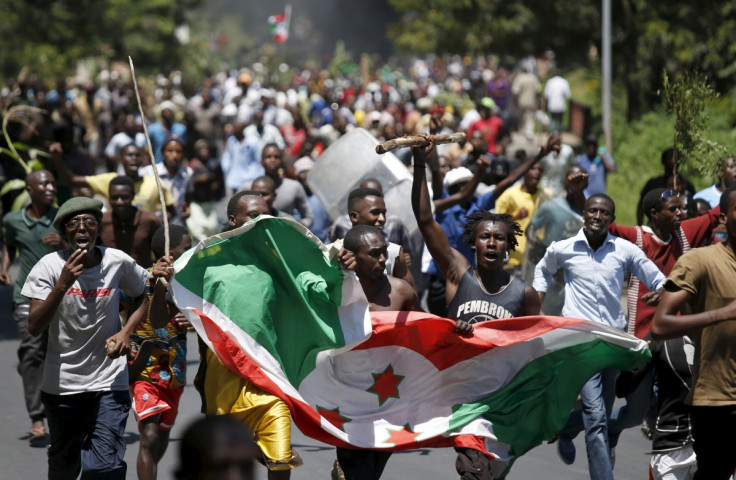Burundi: African Union agrees to send 5,000 troops to strife-torn nation

The African Union has agreed "in principal" to send troops to Burundi to stop the country from spiralling into anarchy, a diplomat told AFP.
The country's current political crisis pits supporters of President Pierre Nkurunziza against opponents, who say his re-election in July for a third term violated the constitution in a nation still reeling from its civil war that occurred between 1993 and 2005 and left 300,000 people dead.
Sitting in Addis Ababa, the AU was considering an unprecedented plan to send 5,000 troops from the East Africa Standby force into the strife-torn nation on the day the union warned it would not allow another "genocide" on the continent, which could have serious ethnic overtones as well as alarming regional consequences.
The AU's Peace and Security Council (PSC) "took a decision yesterday to send troops to protect civilians," senior AU official Bonaventure Cakpo Guebegde told AFP.
He added: "These troops will be under the banner of the East African Standby Force."
No decision has been made on the potential size of any force, which would require the agreement of Burundi, or a vote by AU presidents before any deployment is approved.
While the AU's PSC urged the Burundi government to confirm within 96 hours its acceptance of the deployment of African Prevention and Protection Mission in Burundi (MAPROBU), as it is to be called, the council also recommended troops should go into Burundi whether or not the Burundian government wants it.
It decided, in the case of non-acceptance by Bujumbura, to recommend the implementation of Article 4 (h) of the AU's Constitutive Act, which authorises it to intervene militarily in a member state, even without its permission, in "grave circumstances", to prevent "genocide, war crimes and crimes against humanity".
Olivier Nduhungirehe, Rwanda's ambassador-designate to Belgium, tweeted that it would have a strength of 5,000 military personnel and police and would be deployed for an initial period of six months, which would be renewable. "MAPROBU will mainly be in charge of preventing any deterioration of the security situation & protecting civilians under imminent threat," he wrote.
The East African Standby Force was established in 2003 to maintain peace and security, and its participants include Burundi, Comoros, Djibouti, Ethiopia, Kenya, Rwanda, Seychelles, Somalia, Sudan and Uganda.
Civil war likely
Burundi is now "on the cusp of a full-blown civil war," United Nations human-rights chief Zeid Ra'ad Al Hussein said on 18 December, hours before a majority of states on the United Nations Human Rights Council (UNHRC) floor called for "robust, decisive" action to avert it.
Burundians, meanwhile, expressed their frustration as the UNHRC prepared to approve a new resolution to prevent the deterioration of the human rights situation in the country, saying civilians needed troops to be sent in immediately.
More than 100 people were killed earlier in December following renewed violence. And at least 400 people have died since the violence flared up in April, while up to 68 of these may have been extra-judicially executed in November, the UNHRC claimed. It added that at least 3,496 people have been arrested in relation to the political crisis. Around 220,000 people are refugees in neighbouring countries, with many others internally displaced.
© Copyright IBTimes 2024. All rights reserved.






